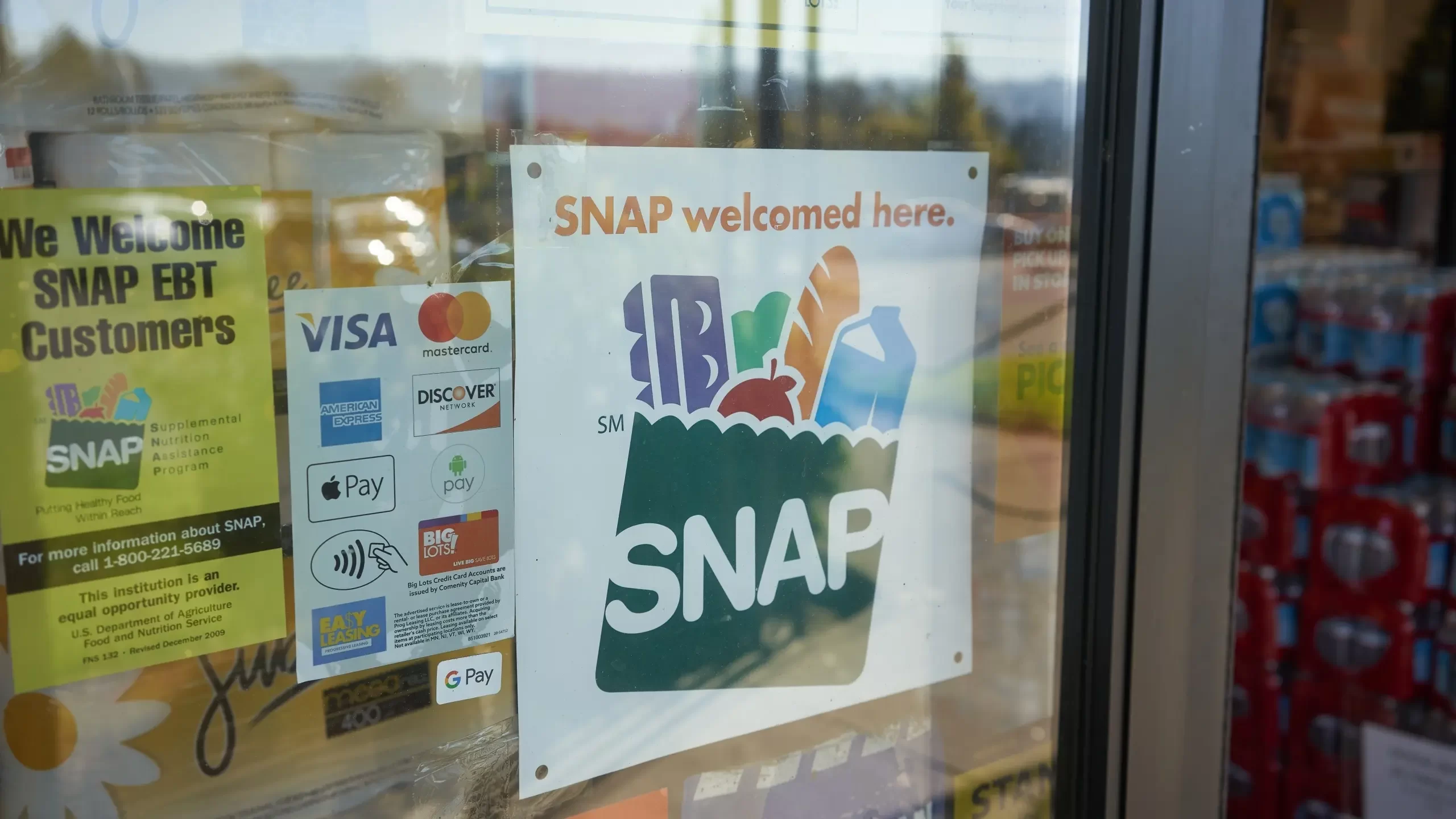Last week, Republican lawmakers in the U.S. House Agriculture Committee passed legislation that would cut as much as $300 billion from the Supplemental Nutrition Assistance Program, also known as SNAP, which provides benefits to low-income families to subsidize their food and grocery costs.
More than 42 million Americans rely on SNAP to afford food, but Republicans are looking to gut the program in order to finance President Trump’s “big beautiful bill,” which, among other things, would expand tax cuts for the wealthiest Americans.
APR spoke with Alabama Arise’s senior policy analyst, Carol Gundlach, to better understand what the Republican overhaul of SNAP entails and how cutting SNAP could affect Alabamians across the state.
Gundlach began our conversation by detailing how the Republican proposal would shift the cost of administering SNAP from the federal government to the states, a move that would heavily impact Alabama’s General Fund.
“Assuming that it passes in the form that came out of the House Agriculture Committee, the real simple bottom line is it would cost Alabama at least $115 million to $120 million in General Fund money if you wanted to maintain the SNAP program,” Gundlach told APR. “Now, I say ‘at least’ because what the bill that came out of the Ag Committee does is it increases Alabama’s share of the cost of administering the SNAP program. It basically moves that from 50 percent to 75 percent. We think that would cost us $35 million more or less a year.”
Gundlach explained that states could face even higher cost burdens under the proposal depending on their “error rate” when distributing SNAP benefits.
“It would require that states pay for at least 5 percent of the actual cost of the food benefits that are distributed, but it will increase that amount based on the state ‘error rate.’ The error rate is a really complicated formula that looks at how much states overpaid or underpaid in benefits, and it looks at the timeliness of getting benefits out,” she explained. “It is not a measure of fraud and, you know, [U.S. Rep. Barry Moore, R-Ala.] during the committee discussion kept talking about the error rate representing fraud — that is simply a misunderstanding of what the error rate is. Alabama’s got one of the lowest error rates in the nation, but we’re at 7 percent, and we’ve always been real proud that we have such a good error rate. We are worried about how this formula is gonna work itself out. If we even just had to pay for 5 percent of benefits that would be a hit of about $90 million to the general fund.”
According to the Center on Budget and Policy Priorities, Alabama could be hit with additional costs ranging from $86 million to $431 million depending on the state’s future error rates if the Republican legislation passes into law. Between 2003 and 2023, Alabama’s highest recorded error rate was 8.02 percent — under the Republicans’ proposal, that error rate would carry an estimated $344 million price tag for the state today.
However, it is important to note that these cost estimates are based on the size of the population currently receiving SNAP benefits in Alabama. In reality, those costs would likely be lower than estimated if the legislation were to pass due to other provisions of the bill which would directly cut food benefits and terminate eligibility for many SNAP participants, thereby reducing Alabama’s financial obligation by kicking Alabamians off of SNAP.
Gundlach said she does not know how the state will be able to afford the increased cost of administering SNAP without letting many Alabamians go hungry.
“I simply can’t imagine how we could do this. I spend my life watching the budgets and I have no idea, in a time of slightly declining revenues but also all kinds of other increased costs, how on Earth the general fund could come up with that amount of money every year, year in and year out. And if they push us to more than 5 percent, which is possible, I really don’t see how we could do it,” Gundlach said. “And so that leaves the state in a really difficult position. They could try to push people off of SNAP — and there are some procedural ways that could be done under existing law — because if you get the population down, the benefits go down… but it’ll leave people out there hungry.”
“And so there are implications for the state budget that I’m really worried about, but there are also implications for people who get SNAP benefits, because if they can’t get the SNAP benefits because the state can’t pay their match, then they’re left hungry and they’ve already cut food banks back,” she continued. “I have no idea how Congress thinks people can feed their families if this bill passes.”
Gundlach also expressed that she views the legislation as a way to shift the blame for cutting social services away from federal lawmakers and instead pinning it on the states.
“I think it’s really upsetting that what they’re basically doing is they want to cut access to SNAP, and to Medicaid, and to a number of other programs, but they don’t want Congress to have to take the heat. And so they’re just pushing it to the states, and they’re pushing the cost to the states, and then they’re going to let the Alabama legislature or the governor have to decide who gets hurt and who doesn’t, and that’s pretty awful,” Gundlach said.
Gundlach also lambasted the Republicans’ explicit desire to slash programs like SNAP and Medicaid as a vehicle for financing further tax cuts for the ultra-rich.
“Of course, that’s the the biggest factor here is [Republicans] have got this bill that extends the tax cuts that were passed eight years ago, which are cuts that disproportionately benefit the richest people in the country: millionaires and billionaires. I mean it really is a billionaire tax cut,” Gundlach said. “It would extend those tax cuts, but they’ve gotta pay for it under Congress’ rules, so how do you pay for it? Well, you could pay for it by increasing taxes on other people, increasing taxes on the rich and not giving them these tax cuts, or you can cut benefit programs for the poor. They’re choosing to cut food assistance for hungry families and hungry children and health care for the sick and the disabled in order to give tax cuts to billionaires, and it’s pretty awful. It’s pretty deplorable.”
In 2024, over 750,000 Alabamians — 15 percent of the state’s total population — received SNAP benefits. SNAP also brought an average of 115,000 Alabamians, including 51,000 children, above the poverty line each year between 2015 and 2019.
“The people who are on SNAP are disproportionately families with children in the household. They are disproportionately the elderly and the disabled and are just very low-income people. And a lot of them are, you know, the working poor — people who are working 20 hours a week as a cashier and are working hard to support their families. Those are the people who are going to pay the cost for this,” Gundlach noted.
Gundlach also shared her concerns about the impact that proposed increases in SNAP eligibility requirements might have on families with children, especially in light of Alabama’s distinct lack of accessible and affordable child care.
“Parents of really very young children are going to have to decide what to do with those children while they’re out there hunting for a job or working hours that the child is not in school,” Gundlach said. “I worry about an increase in child welfare cases. I worry about bad things happening to children if people are forced to choose between feeding their families and what they do with inadequate childcare.”
Beyond the immediate impact which reducing SNAP benefits would have on poorer Alabamians, Gundlach also highlighted the downstream consequences which these cuts could have on local businesses and the state economy. Currently, around 5,000 retail locations are authorized to sell food to SNAP beneficiaries in Alabama.
“Between [SNAP and Medicaid], we’ve got a really big population of Alabama that gets U.S. benefits, and they spend those SNAP benefits at grocery stores. The National Grocers Association and the Alabama Grocers Association are very concerned because they represent the little independent grocery stores, and it’s those independents that are most dependent on SNAP expenditures,” Gundlach noted.
“So, the less SNAP money that gets spent at those grocery stores, that means little bitty towns are going to lose their Piggly Wiggly, they’re going to lose their independents — even Walmarts are going to get hurt,” she continued. “Those are jobs, those are locally owned businesses that employ local people, and they’re going to run the risk of having to lay people off or closing for good, leaving the whole community without a grocery store. Same thing would be true with Medicaid, they spend those benefits at doctor’s offices and hospitals and pharmacies. If we cut people off of Medicaid, we’re losing rural hospitals.”
With Republican in-fighting over Trump’s budget package casting uncertainty on which domestic policy proposals will ultimately become law, Gundlach said she simply cannot predict whether or not the proposed SNAP cuts will actually take effect. Regardless, she said that Alabama Arise will continue to push back against such policies.
“Alabama Arise and all of our partners all over the state are really working to engage our congressional delegation to understand how serious this would be for Alabama. And that’s true all over the country,” Gundlach said.
Now that it has passed out of the House Agriculture committee, the legislation to cut SNAP is now being considered by the House Budget Committee where it must first pass before it can see a full floor vote in the chamber.


















































